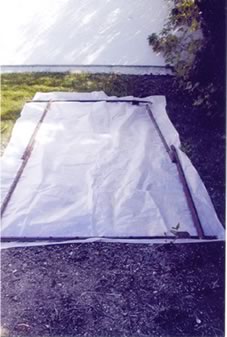|
Summer Break Maintenance
Some schools are closed during the summer months. Without any maintenance during this time, a garden will quickly become overgrown with weeds. Weeds that are drought resistant will soon take over the entire garden even without irrigation. This is not a major problem as there are several methods to manage the garden during the summer break.
Volunteers
One method of maintaining the garden during the summer months is to enlist several volunteers to spend a few hours a week weeding and watering while school is not in session. Click here for suggestions on how to recruit and train volunteers.

A big advantage in having a summer volunteer staff is that the garden should be nearly weed free and ready to plant in September when the school year begins. A few students may also volunteer to drop by their garden in the summer months just to look after things. An arrangement should be made with school security for both adult and/or student volunteers to have access to the garden areas during the summer. If the volunteers and students are willing, a scheduled time may be set up for the summer garden crew to work together.
Mulch
Cover the garden beds with black plastic or a two to four inch layer of mulch to exclude light to keep weeds from growing. Materials like compost or wood shavings can be mixed in the soil when you are ready to plant.
Solarization
Solarization is an easy method for controlling weeds for a few months. This requires the removal of all vegetation from the garden plot, tilling the soil and watering thoroughly. Then, completely cover the ground with a clear plastic sheet for at least six weeks. The sun’s rays will heat the ground under the plastic and kill germinating weed seeds, insects and some soil diseases. Secure the plastic sheet around the edges with boards or rocks to keep the wind from blowing it off. Inspect the garden every couple of weeks to insure the plastic remains in place.

When school begins remove the plastic and the gardening program starts with a nearly clear soil. One disadvantage of solarization is that beneficial earthworms will migrate to deeper cooler soil. They will return gradually or can be easily reintroduced.
Cover Crops
Planting a cover crop is an alternate way to prepare the garden for the summer months. This technique also requires the removal of all vegetation. The entire garden is then planted with a legume, such as clover. Next fall, use a power tiller to dig the cover crop into the ground. This adds valuable organic matter and nitrogen to the soil. Since the cover crop needs to grow over the summer, some irrigation is required. An automatic irrigation system reduces the need for a person to hand water.
Cover cropping, sometimes referred to as “green manure”, is widely practiced by commercial growers. Solarization is preferred over cover crops among home and school gardeners because less effort is required to prepare soil for planting when school begins.
|

